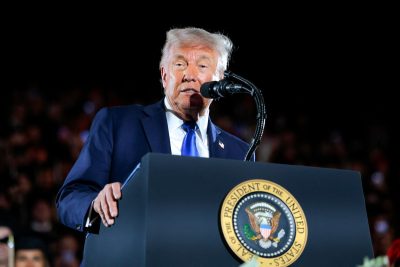In a Split Judgment, US Appeals Court Declares Trump’s Global Tariffs Illegal, President Vows to Fight Back

A divided United States Appeals Court at the weekend ruled that most of Donald Trump’s tariffs are illegal.
Trump has, however, vowed to fight back “with the help of the United States Supreme Court.”
The appeals court allowed the tariffs to remain in place through October 14 to give the Trump administration a chance to file an appeal at the Supreme Court.
The decision comes as a legal fight over the independence of the Federal Reserve also seems bound for the Supreme Court, setting up an unprecedented legal showdown this year over Trump’s entire economic policy.
Trump has made tariffs a pillar of US foreign policy in his second term, using them to exert political pressure and renegotiate trade deals with countries that export goods to the United States.
The tariffs have given the Trump administration leverage to extract economic concessions from trading partners but have also increased volatility in financial markets.
Trump lamented the decision by what he called a “highly partisan” court, posting on Truth Social: “If these Tariffs ever went away, it would be a total disaster for the country.”
The 7-4 ruling by the Court of Appeals for the Federal Circuit affirmed a lower court’s finding that Trump had exceeded his authority in tapping emergency economic powers to impose wide-ranging duties.
The appeals court “incorrectly said that our Tariffs should be removed, but they know the United States of America will win in the end,” he said in a statement on his Truth Social platform, lashing out at the ruling.
He added that he would fight back “with the help of the United States Supreme Court.”
The decision marks a blow to the president, who has wielded duties as a wide-ranging economic policy tool.
It could also cast doubt over deals Trump had struck with major trading partners such as the European Union, and raised the question of what would happen to the billions of dollars collected by the United States since the tariffs were put in place if the conservative-majority Supreme Court does not back him.
Friday’s case, however, does not deal with sector-specific tariffs that the Trump administration has also imposed on steel, aluminum, autos, and other imports.
Since returning to the presidency in January, Trump has invoked the International Emergency Economic Powers Act (IEEPA) to impose “reciprocal” tariffs on almost all US trading partners, with a 10 per cent baseline level and higher rates for dozens of economies.
He has invoked similar authorities to slap separate tariffs hitting Mexico, Canada, and China over the flow of deadly drugs into the United States.
The Court of International Trade had ruled in May that Trump overstepped his authority with across-the-board global levies, blocking most of the duties from taking effect, but the appeals court later put the ruling on hold to consider the case.
Friday’s ruling noted that “the statute bestows significant authority on the President to undertake some actions in response to a declared national emergency, but none of these actions explicitly include the power to impose tariffs, duties, or the like, or the power to tax.”
It added that it was not addressing whether Trump’s actions should have been taken as a matter of policy or deciding whether IEEPA authorizes any tariffs at all.
Instead, it sought to resolve the question of whether Trump’s “reciprocal” tariffs and those imposed over trafficking were authorised, with the document noting: “We conclude they are not.”
In a supplementary filing just hours before the appeals court released its decision, Trump cabinet officials argued that ruling the global tariffs illegal and blocking them would hurt US foreign policy and national security.
“Such a ruling would threaten broader US strategic interests at home and abroad, likely lead to retaliation and the unwinding of agreed-upon deals by foreign-trading partners,” wrote Commerce Secretary Howard Lutnick.
Lutnick added that they could also “derail critical ongoing negotiations” with partners.
Treasury Secretary Scott Bessent, meanwhile, warned that suspending the effectiveness of tariffs “would lead to dangerous diplomatic embarrassment.”
Several legal challenges have been filed against the tariffs Trump invoked, citing emergencies.
If these tariffs are ultimately ruled illegal, companies could seek reimbursements.

